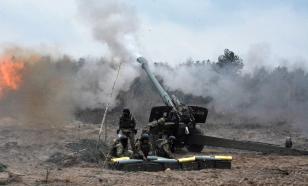Russia in War with Iraq: Moral Choice Made, but not Political
Almost every country has its own interest in Iraq – the US, Great Britain, France, Germany, and Russia. So, how will Russia protect its interest in Iraq?
In the yesterday’s TV prorgamme Vesti Plus, its host Sergei Pashkov asked his guests different questions from international policy. Here are some of them. NATO is on the verge of a split. How deep is the crisis in the relationship between the allies? Will Russia’s role grow in these circumstances? What agreement does want Putin to reach by touring round Europe? And so on.
The participants of the discussion were: Dmitry Rogozin, chairman of State Duma Committee on International Affairs, observer Leonid Radzikhovsky, political science professor Alexandr Rar, who is the author of the book “A German in the Kremlin,” and Ariel Koen, director of Russian Research Programme by the Washington-based Fund Heritage. From everything the programme participants said only one thing was obvious: Russia has no definite position on Iraq, which is sorrowful. While the United States, who is launching its war in Iraq, knows very well what it wants: it wants cheap oil which, like elixir of eternal youth, would give second life to US economy. The US wants a victorious war, after which everybody would not ask who is the host in the house (international law is out of consideration).
It would be stupid to blame it with this: the US is defending its geopolitical and economical interests. If power is so easy of access, it would be enough only to extend the hand and to take it (international institutions have almost lost their positions, so some people already speculate about UN annihilation).
France also has its own position on Iraq, based on its economical and political interests: Iraqi oil France is pumping out and the split in NATO, which in turn provoked split in EU. In this situation, France and Germany may try to “reshape” European map (do you remember talks about unification of two nations?). The Paris-Berlin tandem is able to overcome London, dreaming about leading role in Old Europe.
And what about Russia?
Recently, The Economist compared the Russian President with a bear, who tries to balance on a rope. For Putin is not so independent in the Iraqi crisis. He is forced to take into accounts the oligarchy interests and make controversial statements. Having expressed his satisfaction with contracts signed with Iraq, already next day he threatened to Iraq with repression, if Baghdad hinders weapon inspectors from doing their work. In the framework of a Russian-Iraqi agreement, which allows Iraqis to buy food and medicine, Russian oilmen in Iraq sell 70 percent of Iraqi oil. On the other hand, Iraq owes Russia $ 8 billion (Iraq bought arms from the USSR), though Russia hardly could rely on US promise to take this circumstance into account after the war.
Russia does not want to quarrel with the US because of Iraq, and it does not want to lead down its European partners (Germany is its main trade partner and creditor). Moreover, the Paris-Berlin tandem is oriented for a big play. Though, is there any place for Russia in this big play?
Vladimir Putin knows: the “Old Europe” future, its capability to oppose the US hegemony depends on cooperation between France and Germany, but not on Russia or some small post-communist nations Donald Rumsfeld and US leaders intend to turn into counterbalance to “Old Europe.” The unwary decision of Poland, Czechia, and Hungary to sign along with Tony Blair and Jose Maria Asnar the letter supporting Washington could cost much for the post-communist nations. And Putin certainly understands it.
It is time for Russia to determine its position: is it with the US and Great Britain, or with France and Germany? In the prospect, Russia needs both couples, for it could not alone stop the China aggressive expansion. The decision was found: neither with the first nor with the second. Putin successfully determined his position to have pluses from Iraqi war and to risk almost nothing in these political skirmishes. Though Russia cannot simply wait aside, at least because of its security. “Who is next?” – this is the question almost every country could ask itself, understanding the US certainly has a grudge against it.
Now Washington shows its obvious dissatisfaction with the position of Berlin and Paris on Iraq. They have their own project of settling the Iraqi issue, without a military offensive. They propose to dislocate on Iraqi territory (especially in places where there is a technological base for producing weapons of mass destruction) international forces, which would stay in Iraq till the weapons inspectors activity is completed. This projects was most likely the subject of the consultations Vladimir Putin had in Berlin and Paris.
And one more thing: Russia also does not want to be in Iraq’s place. For war against Iraq would legalize a dangerous precedent in international relations, which first took place when NATO meddled in Yugoslavian affairs. As for Russia, the US and NATO have even more grudges against it, than against Iraq: because of the way nuclear weapon is stored in Russia and old military and civil atom reactors utilized, because of too slow reduction of chemical weapon, environment pollution, human rights violation, war in Chechnya etc.
Russia has to make its choice and take some position on US-British and German-French variants of the Iraqi issue settlement. Moscow’s moral choice is obvious: it is against use of force. Though everybody expects its political choice.
Dmitry Litvinovich PRAVDA.Ru
Translated by Vera Solovieva
Read the original in Russian: https://www.pravda.ru/1/last_news_2.html
Subscribe to Pravda.Ru Telegram channel, Facebook, RSS!


